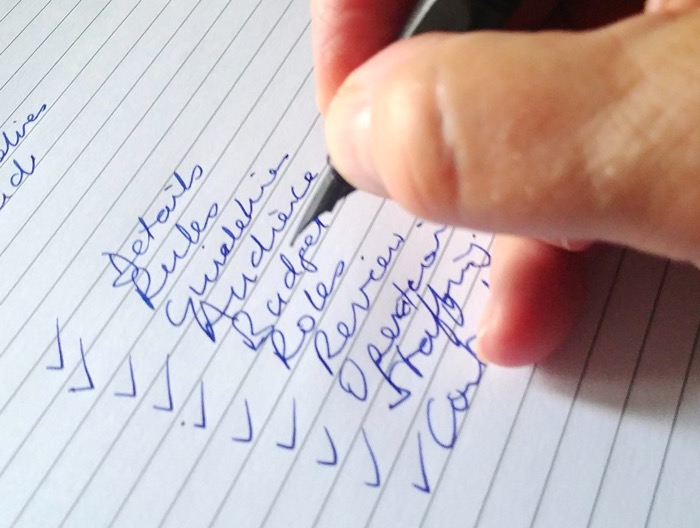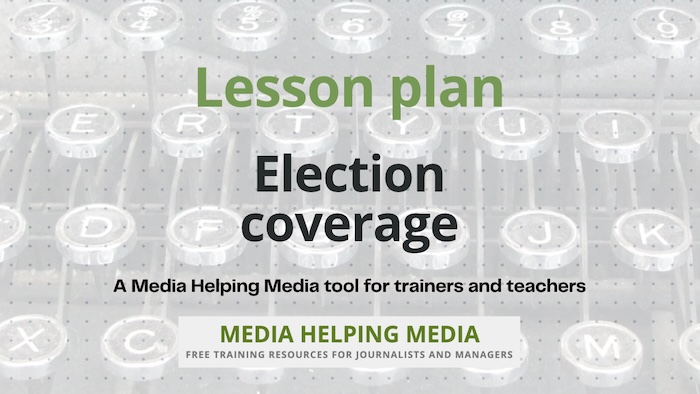
Planning is essential for effective election coverage. The following is a checklist for editors and election coverage teams. It also offers some guidance on special editorial approaches to the campaign. Be careful, however, to adapt this model to local realities.
Do not accept the argument that poorly funded media do not have the means to follow those rules. Journalism on a budget can be priceless.
Election planning checklist
- Details:
- Check with the electoral commission regarding all the details of the coming poll.
- You need to know registration date, start and closing day of the campaign period, election day specifics.
- You also need to know how the polling will be organised, timetable for election returns, etc.
- Rules:
- Study the election rules.
- You need to know about voting system, electoral laws, poll watching, laws governing international observation delegations, use of public opinion surveys, political advertising regulations, access to state media, electoral expenses limitations, etc.
- Understand how the election is supposed to work so that you can be alert to any irregularities.
- Guidelines:
- Join other media, unions of journalists, publishers’ and broadcasters’ associations to agree guidelines, a code of conduct and a charter to be submitted to all political parties, committing them to respect journalists and protect them against harassment by party supporters.
- Consider setting up an election media monitoring group comprised of respected, non-partisan figures charged with protecting the press from aggression and investigating any such incidents.
- Audience awareness:
- Explain to your readers, viewers and listeners your reporting rules.
- Tell them how you are going to cover the campaign and why.
- Budget:
- Make sure you plan the cost of your election reporting.
- An election campaign is usually good business for the media, but costs can run away with you.
- You will need extra phone lines, excellent connectivity, additional cars and drivers, more overtime.
- Plan carefully and allocate resources wisely.
- Underestimating your budget will get you into trouble.
- Keep a sensible proportion of your budget unallocated for contingencies.
- Roles and responsibilities:
- Choose your election team carefully.
- Election coverage is the political desk’s golden hour but should not be its exclusive preserve.
- All departments can be asked to perform duties according to their skills.
- Specialised writers will be commissioned to analyse issues on their beat (economics, health, foreign affairs, economics, labour, education).
- You will also need staff who can compare competing political programmes, to scrutinise speeches and position papers, to track inconsistencies and expose propaganda.
- The foreign desk, for instance, might be assigned to stories related to international observer teams, foreign media coverage, role of international organisations in the campaign, etc.
- Some media organisations set up an election desk for the last weeks of the campaign. This option should be studied carefully especially in small newspapers.
- The election campaign should not compromise reporting of other news.
- Review procedure:
- Appoint an editorial panel which will be charged with reviewing delicate questions that may arise as the campaign develops.
- It should include the editor-in-chief, the relevant department head, and a few distinguished commentators or reporters.
- Operational issues:
- Plan technical and operational arrangements.
- Pin down the advertising department (some pages should be considered ad-free during the campaign, precise guidelines should be given to acceptance and placement of political advertising)
- Talk to the production manager (s/he must provide for later deadlines on election day and for additional pages).
- If you are a newspaper talk to the distribution manager.
- Staffing:
- Recruit additional personnel where needed.
- Young journalists can handle the information flow on election day, phone and fax operators, secretaries, drivers, etc.
- Contacts list:
- Contact resource persons.
- They will be of much help to give expert advice during the election campaign and as soon as the results are public.
- Election pundits, political scientists, public opinion analysts, should be on standby and attached to your particular media.
- Appointments should be arranged in advance with political party leaders for election-night comments on results.
- But do not overwhelm your audience with excessive punditry. Ordinary citizens should have their say too.
- Media assets:
- Check your photo files or your video archives.
- You need to have as many pictures of candidates as possible stored in your photo/video library.
- Backup systems:
- Plan for emergencies.
- What do you do if something breaks down on your side (your computer falls dead, your local journalist cannot contact you, one of your reporters is arrested or wounded, etc).
- And on the side of the government (failure in the collation of results, charges of irregularities, etc).
- Planning is all-important, but never forget that your first responsibility is to the readers, the viewers and listeners.
- Audience empowerment:
- Citizen’s groups which are formed to help voters use the power which elections put at their disposal are very useful.
- Remember who is in charge. In a democracy the citizen is the boss. Elected officials are temporary hired help.
- View the election campaign as the politician’s job application.
- Ask yourself if the candidates are giving you, the employer, the information needed to decide who is best for the job.
- Clarity of content:
- Civic education – media must carefully and repeatedly explain the principles and techniques of voting and what the election will lead to (a new parliament, separation of powers, transparency, etc).
- Media should introduce an open line to readers so they might ask questions on specific points of the campaign and air their views.
- Run more interviews with voters not just “vox-pop” and quick quotes gathered in the street.
- Conduct meaningful and probing interviews about how families are surviving in an economic crisis or how they deeply feel about education opportunities for their children.
- Plans for polls:
- Public opinion polling: unprofessional polls are bad news, for voters and for media.
- Never commission surveys that do not stick to the highest standards and never print them without fully explaining the conditions and the limits of the survey.
- Expose any fraud in a political party or newspaper survey. Never forget that polls will never replace old-style political reporting.
- Fact files:
- Start well ahead of election day: prepare profiles of major candidates, close-ups on most electoral districts (economic base, population profile, major problems, party dominance).
- Backgrounders:
- Cover the issues.
- Pile up documentation on campaign issues (official figures, the state of the debate, major players and lobbies, etc.).
- Cover those issues independently from party positions, report on issues that are neglected by political parties.
- Too often issues are presented as just a conflict between opposing sides and not as objects of serious debate.
- Always ask “what’s missing in the news today?”
- Read everything, remember what the candidates said (and did) over a period of years not just days.
- Do not confuse lobbying by interest groups or media-generated excitement with a grass-roots political movement.
- Do not be afraid of repeating explanatory studies of difficult issues.
- The “We’ve already done it” or “It does not interest anybody” cynicism should never be welcome in a newsroom. At election time is should be banned.
- Style:
- Make stories and issues accessible to readers, de-code all political jargon, track down and annihilate all long words that render already difficult concepts totally incomprehensible.
- Priorities:
- Beware of “pack” journalism.
- Shy away from the tendency to follow candidates like a pack of wolves which leads to concentrate on the same events and interpret them in the same way.
- This happens particularly when a candidate is seen as rising in the polls.
- When a candidate’s support increases sharply the coverage of his candidacy becomes more favourable.
- Stakeholders:
- Keep in touch with who is behind a party or a candidate.
- Examine possible conflicts of interest.
- Look at a candidate’s record or promises and commitments.
- Ask who has benefited or would benefit from a candidate’s proposals.
- Follow the money.
- Who is financing the campaign
- What are the interests of those providing the money
- How will they benefit from the government (new legislation, regulatory power).
- Variety:
- Use all forms of journalism.
- Consider, where appropriate the following.
- Long reportage
- Analytical pieces
- Graphs
- Satire
- Sketches and cartoons
- Investigative journalism (who is behind a particular candidate, the role of special interests, etc)
- Photojournalism
- Profiles
- Interviews
- Contradictory debates.
- Propaganda:
- If you are work for a newspaper give politicians from different parties the possibility to write columns on a fair and rotating basis.
- But stop this process at least two weeks before election day so as not to give undue advantage to one of the candidates and not to overwhelm your readers with party propaganda.
- Stunts and tricks:
- Get acquainted with campaign tricks.
- Beware of stunts and cooked-up events designed just to grab headlines.
- Overhype:
- Do not just publish political parties’ news (press) releases.
- Check them, use them as a source for a more balanced story.
- Do not run for “photo-opportunities”.
- Do not overhype controversy.
- A contrived rumour campaign can lead you far away from voters’ real interests.
- Attribution:
- Never forget that your long-term credibility is always at stake.
- Follow closely each candidate’s advertising campaign.
- Some media have columns which scrutinise campaign promises and advertising techniques.
- Expose falsification and distortion wherever you find it.
- Clearly identify and attribute any information coming from sources other than obtained from independent reporting.
- Review process:
- After the election review the way your team covered the campaign.
- Compare your performance with that of the competition.

Questions
- What is the primary purpose of the election planning checklist?
- Identify two important details that should be confirmed with the electoral commission.
- Explain the importance of studying election rules.
- Describe the role of media in civic education during an election campaign.
- What are some of the operational issues that need to be planned for during election coverage?
- How should media organisations handle political advertising during an election?
- Discuss the significance of having a review procedure in place during an election campaign.
- Analyse the potential impact of “pack” journalism on election coverage.
- Evaluate the importance of using a variety of journalism forms in election reporting.
- Synthesise the steps media should take to maintain credibility during an election campaign.
Answers
- The primary purpose of the election planning checklist is to serve as a guide for editors or election coverage teams to ensure comprehensive and effective election coverage.
- Two important details to confirm with the electoral commission are the registration date and the specifics of election day, such as how polling will be organised.
- Studying election rules is important to ensure compliance with voting systems, electoral laws, and regulations, which helps maintain the integrity and fairness of the election process.
- The role of media in civic education is to explain voting principles and techniques, and to provide a platform for voters to ask questions and express their views.
- Operational issues that need planning include managing advertising space, production deadlines, and distribution logistics to ensure smooth election coverage.
- Media organisations should plan for ad-free pages during the campaign and provide clear guidelines for the acceptance and placement of political advertising.
- A review procedure is significant as it allows for the examination of delicate questions that may arise, ensuring balanced and fair reporting.
- “Pack” journalism can lead to homogeneous coverage, focusing on the same events and interpretations, which may skew public perception.
- Using a variety of journalism forms enriches election reporting by providing diverse perspectives and engaging different audience segments.
- To maintain credibility, media should scrutinise campaign promises, expose falsifications, and clearly attribute information from non-independent sources.
Lesson plan for trainers
If you are a trainer of journalists we have a free lesson plan about election coverage which you are welcome to download and adapt for your own purposes.









